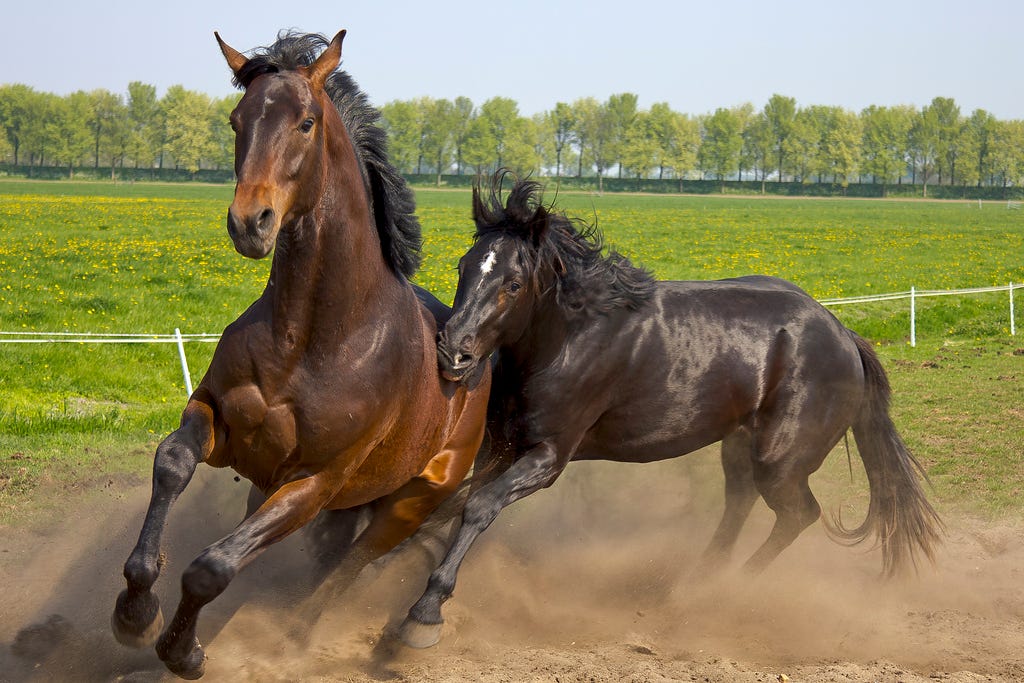essays
Brotherhood Lost and Found

by Mark Wisniewski

Say you’re young. And it’s the early nineties. And you teach writing on one of the coasts to support yourself, and you begin each class by having students write non-stop to fill notebook pages. Just keep the pen moving, you tell them. Don’t stop.
And say one day you write with them, to set an example, and as you scrawl, the words “horse” and “brother” appear, and emotions attack — you might lose it right there, in front of these students. You are so choked up you stand and face the chalkboard and look for chalk that hasn’t been there for years. Why? you think. But you know why. Sort of.
You know for sure your brother was with you when you first saw horses. He held your hand when you couldn’t stop pointing. They’d be running together soon, he told you, and he explained what a jockey was, why silks and saddlecloths came in such different bright colors. In your mind he knew everything, so when they broke from the gate, you rose to watch like he did. He screamed for the nine, which your mother bet on for him with lawn-mowing cash. And when the nine shot past to win going away, you shouted “Go!” like he did, and he grabbed your forearm and squeezed.
Let’s also say that, an hour after you teach this class, you decide to write fiction about horseracing. Fiction, you believe, would be easier. Your goal is a short story a magazine will publish, since you need to publish to keep teaching, and this story’s words rush from you as if someone near is dictating them. In fact this story doesn’t stop for anyone’s 5,000 word max. It wants to keep on. It has legs. It’s a novel, dammit — you have no time for a novel. You need to teach in order to pay rent and eat and engage in things like relationships. So teach is what you do, with this ready-to-run-novel-project shelved.
Then, with a woman, you again visit a track, where, again, thoroughbreds compel you, especially when they sprint. At this point in your life you’ve seen plenty of beauty, in girlfriend’s smiles, in grandparents’ wrinkles, but out here, at this track, the magnificence of so much life on the run beats all. So the next morning, back you are, drafting your novel. But bang, the phone rings: your brother, who lives across the country, is ill with symptoms he’d rather not dwell on. You fear he has HIV, pray he doesn’t. In time he proves disturbingly private compared to those days when he guided your childhood, and, worse, he keeps asking you to keep his illness hush. His livelihood, he explains, depends on your silence. Maybe one day he’ll let you tell the world for him, but not now. Now what he needs is brotherhood.
You respond by maintaining as much reticence as possible. You want your girlfriend to know. You stop writing your novel — fictional horses running no longer quite matter. Anyway you need to teach, so when you talk to people now, it’s more and more often about their writing. These lessons you plan, to encourage others to develop their stories, strike you as why you were put on earth.
Or so you believe until the Thanksgiving weekend you learn it’s true. Goddamn HIV. And this is no line — it’s a truth your brother has told you directly. He again asks for secrecy, and you comply. You return to your horseracing novel, seeing it as a place to corral secrets metaphorically. Its characters grow reticent, too, some up against death at junctures in their lives when the world expects them to love. And now, trying to co-narrate, is a new voice when you write, a black guy’s voice, obviously not your brother’s, because this guy keeps saying he has a story he wants told to anyone who will listen. Like you and your brother, this guy grew up poor. He insists on being in your novel on the days your brother fails to return calls. So when he — the black guy — wants to narrate a chapter, you give him full run.
And run he does. His story, fluid and strong, is that he, too, has seen horses burst out of a gate and go. He gets what you and your brother got. It’s as if he, you, and your brother could win a ton at the track someday. That is, if you keep letting him into this novel. And continue to keep your real brother’s secret.
Rent needs to be paid, though. And lately there’s been this woman. So to publish — in order to teach — you write other stories, short stories, totally made-up. The comical ones get published; you keep teaching and affording a roof; months, then many months, pass. When you’re not teaching, you sometimes go to the track. You like the track. It offers escape from being an adjunct instructor, from rejection by magazines, from the vitriol seemingly thriving in the parts of this country you see on TV. Worse, you sense strongly that by now your brother has full-blown AIDS. And then he tells you he does. He’s tried to keep this from you because, well, you are the easily charged up one, the one who couldn’t stop pointing at horses.
So now your novel insists on exploring discrimination and injustice, on how hatreds like that affect family and trust and budding love. You revise feeling certain your brother would get it. He’d even get the parts about the black guy, whose chapters often focus on trying to stay alive.
Still, you and your real brother don’t seem all that close. Or as in touch as you feel with your characters. Maybe you and he and this black guy will gamble in some story you’ll write, but the longer you revise, the less this seems possible.
Then comes a bad phone call. Your brother can barely walk. Certainly you and he will never charge forth as effortlessly as those horses you watched as kids. Nor will he ever again visit a track with you — the man is infirm. And your novel, wouldn’t you know, starts becoming more of a mess.
And then, near a summer midnight, he is gone. The funeral confuses and darkens your manuscript all the more. His secret is out in the real world; you’ve lost control of it. You’ve lost control of many things. Your ability to love, your enthusiasm for sentences, the encouragement you lent your students — these once-apparent talents have become difficult, and you avoid them.
But when you’re the fortunate son, there’s always another spring. And another, and another again, each enveloping you more brightly than the last. Then, in a lengthy stretch of brightness and sure-footedness, you’re revising you novel with new spirit. You can’t stop reimagining, reconsidering, adding subplots that occur to you because you’ve survived. If this novel will testify to the power of brotherhood, you will tweak it until publication is inevitable.
And, somehow, you find yourself here, in a morning. You are twenty-five years older than when you wrote nonstop with those students, more than a thousand miles from the track where two kids marveled at horses.
But you’re into this morning. It has you satisfied. Because you’re reading proofs of your novel, the one you’ll call Watch Me Go.
Because he said that distinctly, didn’t he?









